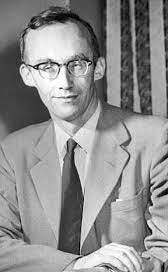One of my favourite scholars is Markus Barth, son of the great Karl Barth, but a biblical theologian in his own right. I’ve blogged about him before and thought I’d throw up a post about him and the Lord’s Supper.
Markus Barth wrote two important works on the Lord's Supper, the first being a lecture delivered in 1945 and published as Das Abendmahl: Passamahl, Bundesmahl, und Messiasmahl (In English: The Lord’s Supper: Passover Meal, Covenant Meal, and Messianic Meal - but never translated into English). The second work was based on lectures given in 1986 and published as Das Mahl des Herrn (English: Rediscovering the Lord's Supper). While Barth’s works do not offer a comprehensive treatment of the theology or practice of the Lord's Supper, they do have doctrinal and practical implications, mostly in an anti-sacramental direction.
Markus Barth accented the communal and transformative aspects of the Lord's Supper. He highlighted the meal’s significance in the context of Christian community and for providing the props that tell us the story we are a part of. The shared meal nourishes the heart and inspires unity among believers, exemplifying the body of Jesusas a metaphor for where all believers are interconnected. This fellowship extends to Jesus’ sacrificial death, emphasizing that his body and blood were offered up as an atoning sacrifice for the salvation of all, transcending temporal and spatial limitations. The act of partaking also becomes a participatory experience, inviting individuals to be actively engaged in the narrative of salvation. By ingesting the symbols of Jesus’ body and blood, believers are reminded of their own spiritual journey and the ongoing process of sanctification.
Barth explores the eschatological dimension of the Lord's Supper. The meal not only looks back to the historical event but also points forward to the future consummation of God's kingdom. In partaking of the bread and wine, believers anticipate the final banquet in the heavenly realm, where the redeemed will commune with God eternally.
Furthermore, in regards to christology, the Lord's Supper serves as a reminder of the story of Jesus and a tangible realization of Jesus’ presence within the faith community. Barth regarded the Lord's Supper as a vivid embodiment of Jesus' teachings and actions. The act of breaking bread and sharing wine resonates with the biblical narratives of Jesus feeding the multitude and turning water into wine. Through these actions, Jesus symbolically emphasizes the themes of nourishment, transformation, and abundance. In addition, the Lord’s Supper reminds us that Jesus remains as Lord of his chuch even while he is bodily ascended to the Father. Viewed this way, the meal encapsulates the paradoxical nature of God's immanence and transcendence, as the physical elements become conduits for encountering the divine. This presence is experienced through faith, as the ritual encourages believers to reflect on their relationship with God and Jesus’ redemptive work. But the elements are never a means of grace or instruments of salvation. That would be to turn the elements into idols.
In sum, Markus Barth explored the multifaceted significance of the Lord's Supper for the church, he was interested in post-War ecumenism and inter-faith conversations with Jews. Baptists might find him making too much of the Supper and Anglo-Catholics might resist his refusal to ascribe anything sacramental to the Supper, but his exposition is beautiful and it is edifying. That is because, above all, Barth what to show how the Lord’s Supper embodies the themes of spiriutal nourishment, unity, eschatology, and presence, all while encouraging believers to actively engage with the story of Jesus' atoning death. As a communal and transformative ritual, the Lord's Supper continues to hold a central place in Christian worship and theology, bridging the gap between past, present, and future in a symbolic yet tangible manner.





I love Barth’s Commentary on Ephesians, but on his theology of the Supper, I would reply along the lines of Flannery O’Connor’s reply to the suggestion that the Eucharist is a symbol. “ Well, toward morning the conversation turned on the Eucharist, which I, being the Catholic, was obviously supposed to defend. Mrs. Broadwater said when she was a child and received the Host, she thought of it as the Holy Ghost, He being the "most portable" person of the Trinity; now she thought of it as a symbol and implied that it was a pretty good one. I then said, in a very shaky voice, "Well, if it's a symbol, to hell with it." That was all the defense I was capable of but I realize now that this is all I will ever be able to say about it, outside of a story, except that it is the center of existence for me; all the rest is expendable.
Do you like his 2 volume commentary on Ephesians or any of his other works?